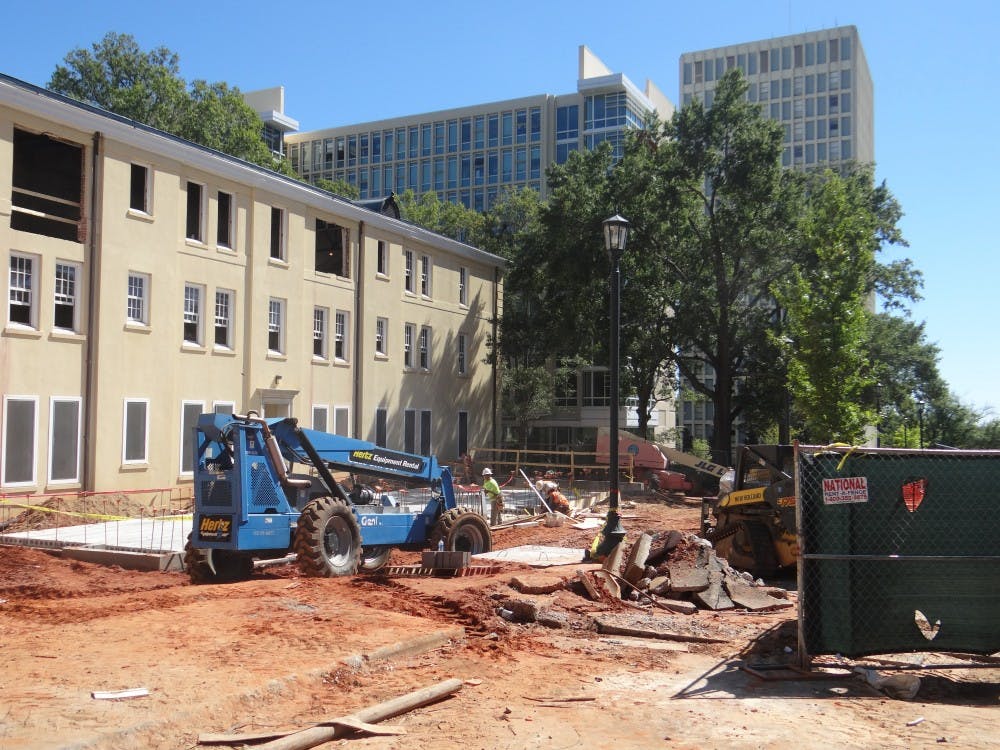Public-private partnership to bring 919 new beds to campus
The University of South Carolina faces a quandary: as it enrolls more freshmen who must live on campus, it pushes upperclassmen out of campus housing.
But it also has an opportunity. Not everyone wants to rent at one of the private, amenity-laden student housing complexes farther away. They do, however, want similar amenities if they live on campus.
USC’s solution, part of its 2010 master plan to extend the campus west and south, is to partner with a developer to build a 919-bed complex behind the Carolina Coliseum with many of the goodies off-campus housing complexes have, according to planning documents filed with Columbia.
USC officials won’t talk about the deal or its structure. It’s hard to pin down what a typical agreement might look like because such partnerships come in many forms, and the term public-private partnership itself can be widely interpreted, Florida State University’s student housing director Adrienne Frame said. In one of the most ambitious proposals so far, the University of Kentucky, facing what it says is more than $205 million in deferred housing maintenance, is looking at turning over all its housing to a private company that will run and expand it under a land lease that could run 50 to 70 years.
Such arrangements are becoming increasingly common.
Private developers own more than half of on-campus dorms in some stage of planning, according to the most recent development activity report from the National Student Housing Council. The National Multi Housing Council, a trade group, created the student housing council to focus specifically on that market.
“With many state budgets limited in terms of money, it’s probably far better for the university to spend its money on classrooms and other things than on living space,” said Jim Arbury, vice president of the National Student Housing Council. “It’s basically a different form of how do we meet the needs that we have without us, meaning the university, putting up a lot of money?”
But Frame is cautious about such deals, though she acknowledges it’s often the best way for a university to create more dorms.
“People say that it’s off-the-books financing,” Frame said. And she warns that it can “require some pretty sophisticated financial negotiations to make sure that you understand the nature of the deal and the requirements within it.”
Florida State, an urban campus like USC, prefers letting developers compete with each other to house the overflow of students rather than getting in bed with them, she said.
“We have focused on being a freshman operation,” Frame said. “We are not trying to house everyone and their aunt here. We do not have capacity to house all our freshmen at this time.”
USC’s statewide system has $555 million in long-term and short-term debt, according to the university’s most recent annual financial report. If a developer finances the new dorm, the university could avoid taking on additional debt for that project and could focus on using its limited borrowing authority on other projects, such as modernizing classrooms, Arbury said.
USC officials, including Joe Fortune, director of university housing, and Jerry Brewer, associate vice president for student affairs, said they would not discuss details, including the project’s financing, because trustees have not approved a contractor. University spokesman Wes Hickman did not respond to several requests for updates on the plan.
However, USC chief financial officer Ed Walton told trustees at a recent meeting that using a private developer to create more campus housing “is beyond delivering education; this is a business.”
According a story in The State, USC was 800 beds short of the dorm space it needs for its enrollment, but it has renovations made to existing dorms, a planned six new houses in the Greek Village and a 919-bed public-private apartment complex in the works behind the Carolina Coliseum.
Dennis Pruitt, vice president for student affairs, has told The State that USC plans to run the complex “at the highest standards as possible.” He said that if USC manages the housing, students would have to follow school rules and that the dorms were likely to have resident mentors.
But some students like Lauren Austin, a fourth-year public relations student, prefer living off campus without resident mentors and strict policies about overnight guests. Austin, who lived on campus in 2010, said she didn’t have a normal experience until she moved into an apartment in the Olympia Mills complex as a sophomore.
“The students that do get stuck in on-campus housing are usually jealous of the ones that get an apartment,” Austin said.
Editor’s note: This story originally appeared on DatelineCarolina.org

